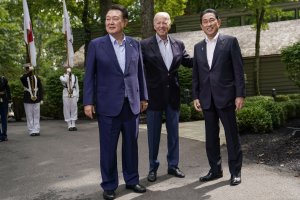Dec. 30 (UPI) — A South Korean court authorized a warrant Tuesday for the arrest of suspended President Yoon Suk Yeol on insurrection and abuse of power allegations following his abortive effort to impose martial law. This marks the first time a sitting South Korean president has faced a court-ordered arrest warrant.
According to the Corruption Investigation Office, Yoon’s arrest warrant must be executed within seven days, unless an extension is granted. Yoon is expected to be detained at Seoul Detention Center, according to the CIO.
A joint investigation team made up of members from the police anti-corruption office and defense ministry ordered Yoon be detained after he ignored three previous subpoenas to submit himself for questioning in connection with declaring martial law on Dec. 3.
Yoon has denied all allegations, rejecting the charge of insurrection by claiming it was opposition lawmakers in the National Assembly he accused of “anti-state activities” and colluding with North Korea who were guilty of abuse of power and that he only declared martial law as a warning.
Yoon remained in office after being impeached by lawmakers in the second attempt on Dec. 14 pending the decision by the Constitutional Court on whether to confirm the impeachment within 180 days.
Since the office of the president confers immunity from prosecution for all criminal offenses, except insurrection and treason, investigators seeking his arrest were required to satisfy judges that the rebellion charge was substantiated and that there was just cause for his snubbing of the CIO’s summonses.
After a motion to impeach passed in a 204-85 vote, Yoon was replaced by Prime Minister Han Duck-soo as acting president. Han was removed from office on Friday to be replaced by his deputy and finance minister, Choi Sang-mok.
Amid a deepening political crisis, Han was brought down by impeachment proceedings over his refusal to appoint lawmakers’ picks for three spots on the Constitutional Court currently weighing up Yoon’s fate.
Yoon’s short-lived imposition of martial law brought an estimated 200,000 protestors onto the streets of Seoul around the National Assembly, where lawmakers reversed his declaration around six hours later in a unanimous vote in the early hours of Dec. 4.
In 2017, President Park Geun-hye was impeached and removed from power by the Constitutional Court and President Roh Moo-hyun was impeached in 2004, but his removal was not approved by the court.
Former presidents Roh Tae-woo, Chun Doo-hwan, Park Geun-hye and Lee Myung-bak were all arrested — but only after they had left office.
South Korea is a young democracy only holding its first free presidential election in 1987 after decades of military rule during which pro-democracy protests were suppressed with brutal and, sometimes, deadly force.

COMMENTS
Please let us know if you're having issues with commenting.